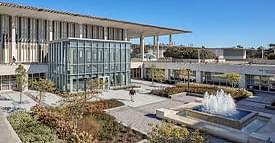₹19.3 L/Yr
Tuition Fees
| Year | 1st Year Fees |
|---|---|
| Tuition Fees | ₹1932232 (USD 22586) |
Courses focus on the characteristics and causes of crime and deviance and on the origins, nature and consequences of societal reactions to crime and deviance, giving particular attention to the criminal justice system. Basic instruction is also given in sociological theory and research methods.
The program is particularly appropriate for students wishing to pursue one of the following career options:
-
graduate work in the social sciences with a special emphasis on criminology or criminal justice
-
a career in criminal justice (e.g., law enforcement, corrections, crime prevention), especially in agencies or departments involved in planning and evaluation
-
a career in law, social work or counseling
- A bachelor's degree is the minimum formal education required. Most entry-level positions for criminology majors reside with law enforcement, governmental, or social service agencies/organizations. Students must usually be willing to start in an entry-level position in order to prepare for advancement. Depending upon the student’s career goals, many employers also require graduate education.
- For example, a master’s degree in criminal justice, forensic science, social work, counseling, public administration, or business may be required for positions involving therapy or higher levels of administration, forensics, and research. A doctorate is required for university-level teaching positions.
Eligibility & Entry Requirement
-
English - 4 units with at least 1 composition course in the 11th or 12th grade.
-
Mathematics - 4 units: Typically college preparatory courses at the Algebra I content/skill level and higher. Courses such as Algebra-I, Geometry, Algebra-II, Statistics, Trigonometry, Pre-Calculus and Calculus are considered traditional college preparatory courses. A course in which content/skill levels fall between Algebra-I and Geometry, or Geometry and Algebra-II, will be evaluated to determine if the course satisfies content requirements.
-
Social Science - 3 units: one unit should be U.S. History, other courses might include additional history courses, sociology and psychology.
-
Physical Science - 3 units: two courses should be laboratory science such as Biology, Chemistry or Physics. Other courses might include Earth Science, Geology, Physical Science, anatomy, and astronomy.
-
Foreign Language - 2 units of a single language other than English or demonstrated proficiency equal to a typical second level course.
TOP Scholarships
| Scholarship name | Award amount | Eligibility |
|---|---|---|
| - | - | - |
| - | - | - |
| - | - | - |
Key Resources for Your Study Abroad Journey
Scholarship Grants & Financial Aids
| Name | Scholarship Per Student | Level of Study | Type | |
|---|---|---|---|---|
| Collegedunia $150 Scholarship Program | Scholarship per student₹ 12,833/Yr$150 | Level Of StudyBachelor | TypeMerit-Based | |
| Comindware Scholarship | Scholarship per student₹ 3.4 L/Yr$4,000 | Level Of StudyApprenticeship | TypeMerit-Based | |
| R&D Systems Scholarship | Scholarship per student₹ 1.3 L/Yr$1,500 | Level Of StudyBachelor | TypeMerit-Based | |
| BL Mandhana Scholarships | Scholarship per student₹ 8.6 L/Yr$10,000 | Level Of StudyBachelor | TypeMerit-Based | |
| Deutschland Stipendium Program | Scholarship per student₹ 3.7 L/Yr$4,363 | Level Of StudyBachelor | TypeCollege-Specific | |
| Forktip Women’s- Innovation Scholarship | Scholarship per studentVariable Amount | Level Of StudyBachelor | TypeCollege-Specific |
Similar Colleges


University at Albany


Northern State University


Abilene Christian University
.jpeg?h=143&mode=stretch)

Ohio Northern University


University of South Carolina


University of Akron


State University of New York Polytechnic Institute


Alcorn State University
















.png?h=40&w=40&mode=stretch)











Comments